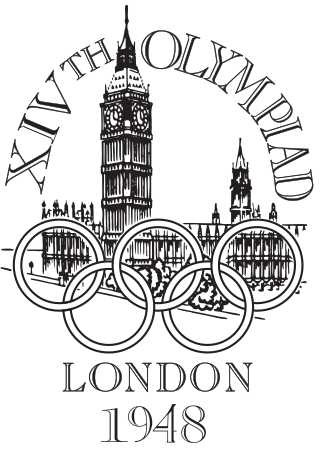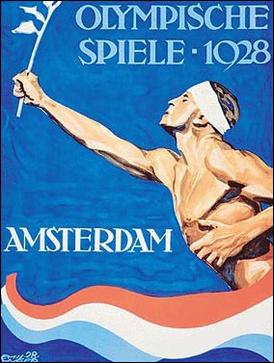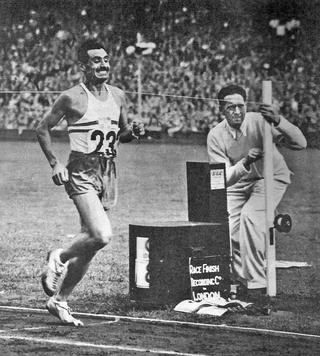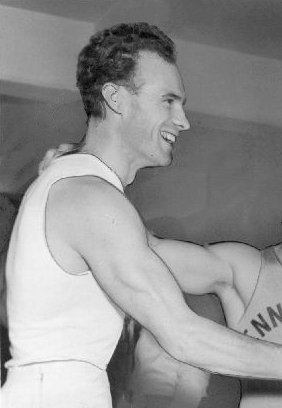Related Research Articles

The 1948 Summer Olympics were an international multi-sport event held from 29 July to 14 August 1948 in London, United Kingdom. Following a twelve-year hiatus caused by the outbreak of World War II, these were the first Summer Olympics held since the 1936 Games in Berlin. The 1940 Olympic Games had been scheduled for Tokyo and then for Helsinki, while the 1944 Olympic Games had been provisionally planned for London. This was the second time London hosted the Olympic Games, having previously hosted them in 1908, forty years earlier. The Olympics would return again to London 64 years later in 2012, making London the first city to host the games thrice, and the only such city until Paris and Los Angeles host their third games in 2024 and 2028, respectively. The 1948 Olympic Games were also the first of two summer Games held under the IOC presidency of Sigfrid Edström.

The 1928 Summer Olympics, officially known as the Games of the IX Olympiad and commonly known as Amsterdam 1928, was an international multi-sport event that was celebrated from 28 July to 12 August 1928 in Amsterdam, Netherlands. The city of Amsterdam had previously bid for the 1920 and 1924 Olympic Games, but was obliged to give way to war-torn Antwerp in Belgium for the 1920 Games and Pierre de Coubertin's Paris for the 1924 Games.

The 1924 Summer Olympics, officially the Games of the VIII Olympiad and also known as Paris 1924, were an international multi-sport event held in Paris, France. The opening ceremony was held on 5 July, but some competitions had already started on 4 May. The Games were the second to be hosted by Paris, making it the first city to host the Olympics twice.

At the 1900 Summer Olympics in Paris, seven swimming events were contested. Only men competed in the swimming competition. There was a total of 76 participants from 12 countries competing. The games are referenced in Yann Martel's 2001 novel Life of Pi. As with the rowing events, swimming took place on the Seine between the Courbevoie Bridge and the Asnières Bridge.

Olympic sports are sports that are contested in the Summer Olympic Games and Winter Olympic Games. The 2020 Summer Olympics included 33 sports; the 2022 Winter Olympics included seven sports. Each Olympic sport is represented at the International Olympic Committee (IOC) by an international governing body called an International Federation (IF).

The 1948 Summer Olympics was an international multi-sport event held from July 29 through August 14, 1948, in London, United Kingdom. It was the first Olympic Games to take place in twelve years, due to the Second World War, with London being chosen as the host city in May 1946.

The Special Olympics World Games also known as Special Olympiad are an international sporting event for participants with intellectual disabilities, organized by the IOC-recognised Special Olympics organization.
A demonstration sport, or exhibition sport, is a sport which is played to promote it, rather than as part of standard medal competition. This occurs commonly during the Olympic Games, but may also occur at other sporting events.

Eugen Stahl Schmidt was a Danish shooter, athlete, and tug of war competitor. He competed at the 1896 Summer Olympics in Athens and at the 1900 Summer Olympics in Paris.

Olof Agne Laurentius Holmström was a Swedish sprinter who competed at the 1920 Summer Olympics. He won a bronze medal in the 4 × 100 m relay, but failed to reach the finals of individual 100 m and 200 m events.

Slovenia first participated as an independent nation at the Olympic Games at the 1992 Winter Olympics in Albertville, France, and the country has sent athletes to compete at every Games since then. The Slovenian Olympic Committee was established in 1991 and was recognised by the International Olympic Committee on 5 February 1992.
Michael Reusch was a Swiss gymnast and Olympic champion. He competed at the 1936 Summer Olympics in Berlin, where he received silver medals in parallel bars and team combined exercises. At the 1948 Summer Olympics in London he received a gold medal in parallel bars, and silver medals in rings and team combined exercises.

The men's 100 metre freestyle event at the 1952 Summer Olympics took place between 26 and 27 July at the Helsinki Swimming Stadium. There were 61 competitors from 33 nations. Nations had been limited to three swimmers each since the 1924 Games. The event was won by Clarke Scholes of the United States, the nation's second consecutive and seventh overall victory in the men's 100 metre freestyle. Japan, absent from the 1948 Games after World War II, returned to the podium in the event with Hiroshi Suzuki's silver. Göran Larsson earned Sweden's first medal in the event since 1908 with his bronze.
La canne, a French martial art using canes as weapons, was featured in the Summer Olympic Games demonstration programme in 1924. The demonstration was associated with a single match between Professor Prévot and the champion of France, Beauduin.
Savate, also known as French kickboxing, was featured in the Summer Olympic Games demonstration programme in 1924. There were 19 competitors from France and Belgium.
Kite flying was on the Summer Olympic Games programme in 1900. These events have generally not been classified as official, although the IOC has never decided which events were "Olympic" and which were not. Kite flying events are sometimes classified under ballooning.

Gymnastics at the 2016 Summer Olympics in Rio de Janeiro was held in three categories: artistic gymnastics, rhythmic gymnastics and trampolining. All gymnastics events were staged at the Arena Olímpica do Rio from 6 to 21 August 2016.

Gymnastics at the 2020 Summer Olympics in Tokyo was held in three categories: artistic gymnastics, rhythmic gymnastics and trampolining. All gymnastics events were staged at the Olympic Gymnastic Centre, Tokyo in 2021.
William Henry Roetzheim, Jr. was an American gymnast, collegiate coach, and adminstrator. He competed at the 1948 Summer Olympics and the 1952 Summer Olympics. Roetzheim won gold at the 1951 Pan American Games, and he was also an army veteran who served in the Korean War.

The men's horizontal bar competition at the 1952 Summer Olympics was held at Töölö Sports Hall, Exhibition Hall I from 19 to 21 July. It was the eighth appearance of the event. There were 185 competitors from 29 nations, with each nation sending up to 8 gymnasts. The event was won by Jack Günthard of Switzerland, the nation's second consecutive and third overall victory in the horizontal bar, breaking a tie with the United States for most all-time. Switzerland also took one of the silver medals, as Josef Stalder tied with Alfred Schwarzmann of Germany, competing at the age of 40, for second. Stalder and Schwarzmann were the first two men to win multiple horizontal bars medals; Stalder had won the event in 1948 and Schwarzmann had earned bronze in 1936.
References
- ↑ "Demonstration sports : history at the Olympic Summer Games / The Olympic Studies Centre". Olympic World Library. 2024-01-19. Archived from the original on 2024-01-19. Retrieved 2024-01-27.
- 1 2 Graham, Luke (2012-08-04). "Steamboat's Sven Wiik recalls 1948 London Olympic". SteamboatToday.com. Retrieved 2024-01-28.
- ↑ "Olympedia – Swedish Gymnastics (Exhibition #1), Open". Olympedia – Main Page. 1948-08-07. Retrieved 2024-01-28.